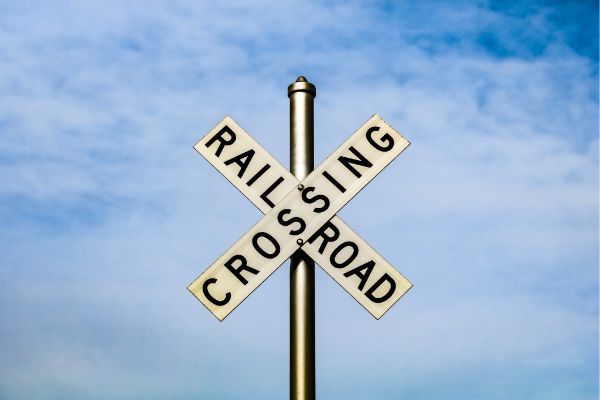
A railroad crossing can be dangerous, especially for 18-wheel and tandem truck drivers. Trucks, tractor-trailers, and buses are involved in as many as ten railroad crossing accidents per week. Although buses are involved in fewer than the total for trucks, the results are more horrific.
In fact, railroad crossings are so dangerous the FMCSA makes it a “serious offense” to cross the tracks “…unless there is enough space to drive completely through the crossing without stopping…” This serious offense carries an immediate 60-day disqualification for CDL holders who get their first conviction. A 120-day disqualification for a second conviction within three years of the first, and a one-year disqualification for a third offense.
Civil Fines and CA Penalties for Railroad Crossing Violations by Bus & Truck Drivers
Along with the disqualification, according to the FMCSR Part 392, there is a possible civil penalty of up to $2,750 for the driver. The carrier could get an $11,000 fine for allowing, condoning, or creating a policy to support wrongdoing.
These disqualifications and civils penalties do not occur until after the state notifies the FMCSA of the conviction. Therefore, the driver must have been convicted at the state level. In CA, the conviction entails an approximate $490 - $500 fine and receives a DMV assessment of 1.5 Negligent Operator Treatment System (NOTS) points.
What’s more, appealing the conviction might not help to avoid the disqualification. The disqualification might go into effect before your appellate trial. However, if you win on appeal, you can request reinstatement and the removal of the CSA points in your DataQs with a Request for Data Review (RDR).
Relying on an appeal is not a good strategy. The best option is to consult a knowledgeable traffic ticket attorney to challenge the law enforcement officer’s (LEO) assessment of facts. The LEO’s vantage point might not have been adequate to view whether you stopped before the 15 foot minimum from the first track. There are other legal justifications your attorney could use.
CA Vehicle Code (CVC) 22451, Special Stops Required, stipulates that any vehicle “…approaching a railroad or rail transit grade crossing shall stop not less than 15 feet from the nearest rail…”
All drivers must ensure that there is not a second train on a second track and cannot proceed until it is safe. However, CDL holders must be able to cross the track without stopping or shifting gears.
Tips to Bus & Truck Drivers about Safe Railroad Crossings
All drivers should observe these tips, but these are particularly helpful to CDL holders:
- Stop a minimum of 15 feet from the track, and turn on your emergency flashers to warn other drivers of your stop.
- Always assume there is a train coming. Use all audible and visual means to ensure there is no train before continuing. Look for lights and turn off your radio and roll down the window to listen for a train.
- Once you are sure it is safe to cross, use the highest gear possible and cross without stopping.
- If your vehicle stalls on the tracks when a train is coming, get everyone out. Bus drivers should open all doors to get passengers out. Instruct everyone to move up the track in the direction of the oncoming train. However, move outward at a 45-degree angle away from the tracks. When the train hits the bus or truck, debris will fly forward and sideways of the train's direction of travel. Have someone call emergency services immediately after getting away from the vehicle.
- Never try to “beat” the train, drive through warning lights (unless they appear to be broken), or around gates.
Using these tips can help avoid train, passenger, and commercial vehicle accidents.
DMV Hearings
Accumulating four NOTS points within one year, six within two, or eight within three years will result in a DMV "Order of Suspension/Probation" getting issued.
A CDL holder can request a DMV Hearing to request more NOTS points, up to six, eight, or ten depending on their "exposure." Since most CDL holders drive many more miles than the average driver, by law, the DMV can consider that exposure to award a higher limit. This exposure is provided only when the majority of the points were not in their private vehicle.
Attorneys who practice only traffic law have the best chance of providing you the representation you need.
Traffic Ticket in Kern County
Call Bigger & Harman in Bakersfield at 349-9300. Se habla Español (661) 349-9755.
We are traffic law attorneys. We only handle traffic law cases and give CDL holders a free consultation. We understand bus and truck drivers or anyone that drives for a living cannot just accept a ticket and pay the fine or take a day off to challenge it in court. Our first action, if we accept your case, is typically to request a dismissal. Quite frequently, because of our familiarity with California traffic law, our strongly worded requests are approved.
If that does not work, we will request a reduced charge with your approval. Often, we can get a no-point conviction where you have to pay the fine for a non-moving violation. This approach could save your career, and it will always save you money because there is no increase in insurance premiums. As you know, you cannot accept Traffic School if you received a citation in a CMV.
Give us a call or send us an email, attorney@biggerharmanlaw.com.
References:
The 2019 CA Commercial Driver Handbook .pdf
The combinedexpress.com blog, 8 Railroad Crossing Safety Tips For Truck Drivers
The FMCSR Part 392, Highway Railroad Crossing Safe Clearance
The FMCSA DataQs page, Request for Data Review (RDR)
